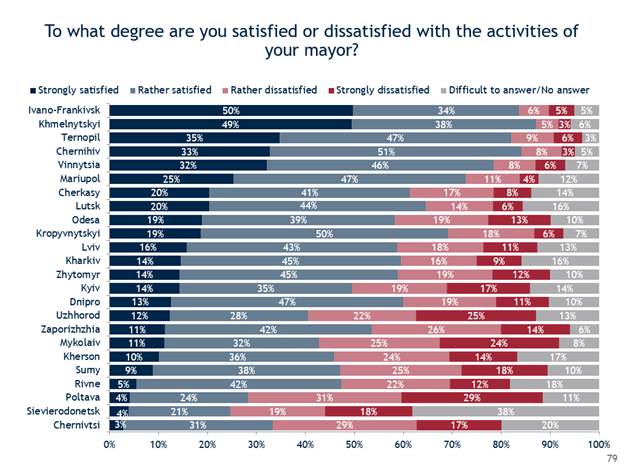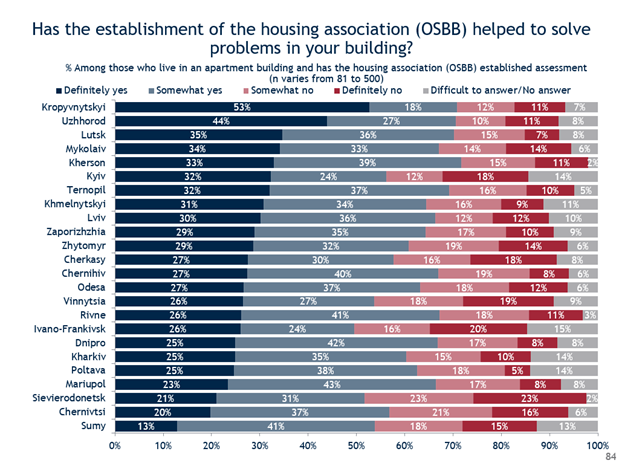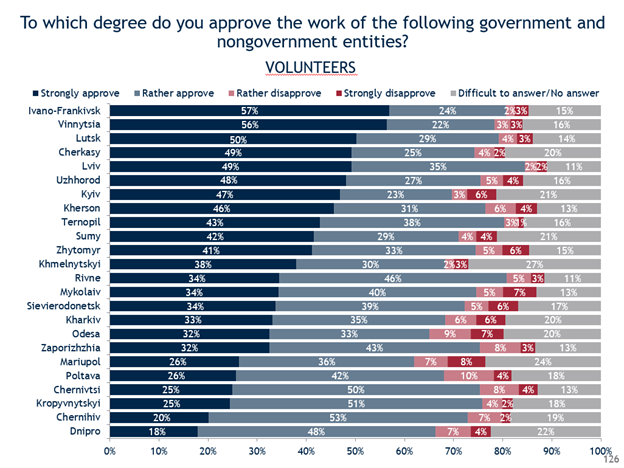
Ukraine is a stronger nation today than it was eight years ago, when Russia last invaded Ukraine from the East and illegally annexed Crimea in the South. Its strength is attributed to improving and securing the lives of citizens, from military might to judicial impartiality and governance expertise. Since 2014, reliable sources routinely emphasize the country’s military restructuring and modernization, though emphasis needs to be given to Ukraine’s advances in governance capacity as well. As Ukraine stands ready to defend against another Russian offensive, observers should recognize the unprecedented steps Ukraine has taken to improve, strengthen, and streamline governance, while fostering a sense of Ukrainian unity.
The International Republican Institute (IRI) has tracked Ukrainian public opinion through annual polls since 2009. IRI data indicates that approval ratings of the level of competence and effectiveness of government has appreciated over the years, especially at the local and regional levels.
Ukrainians have embraced and supported decentralization reforms that overhaul the relationship between citizens and their government. They continue to transfer administrative power away from an inherited system of centralization, red-taping, and opaque decision making to a structure that enables more decentralization, local efficiencies, and transparent and democratic input.
Underscoring this appreciation are three points illustrating the deep and cross cutting reforms taking place across Ukraine.
1. Ukrainians are increasingly satisfied with their local governments and leaders
Decentralization has strengthened fiscal accountability on the local level, as well as electoral processes and a vibrant range of political parties on the national and local level. According to data, Ukrainians approve of their local governance in a majority of the largest municipal centers.
The increase in satisfaction may be attributed to enhanced fiscal autonomy on the local level. Prior to reforms, tax revenue was gathered in a collective manner and disbursed from centralized channels by the national government through governors. This process was overhauled in the wake of EuroMaidan.
Residents now keep a significant portion of tax revenue at the local level. Rather than being discharged by a far-removed national authority, this revenue is now exercised by local authorities for local projects with direct input from the community. The result has been a growth in new infrastructure projects, participatory budget programs, and incentives for locals to take part in decision making.
Decentralization efforts continue to be promising and may give consequential electoral opportunities. With proper incentives and functional processes in place, a new generation of Ukrainians are learning to work within institutions to overhaul the broken while building on the functional.

2. Urban Islands of Democracy
Housing association reforms significantly changed management of private property and are proving to be a microcosm of decentralization. Reforms enabled private management of apartment buildings and the creation of private associations, known by the Ukrainian acronym “OSBB.” These associations facilitate voting and issue-based communication. Residents can run for office, vote candidates into office, and practice consensus building on key issues. OSBB members—like all citizens in Ukraine—now get a transparent view of and a vote on mechanisms for association fee collection, allocation of resources, and procurement of public goods.
Additionally, property ownership is bolstered. Owners and residents control allocations and collections of budgets and they vote into office a Head of the Association, a Secretary, and a Treasurer, all of whom work together to represent the residents’ will in property management. These associations are also empowered to arbitrate under-performing contracts. In effect, this level of proprietorship is supporting local ownership while promoting competition among service providers.
IRI found through public opinion research that more than 50% of respondents across all oblasts reported a definite or somewhat positive impact of OSBBs in solving residents’ problems.

3. Volunteers and volunteerism are the most approved of institution in the country
Volunteerism has become a broad and storied activity in Ukraine. During the heated months that followed the Russian invasion in 2014, Ukrainians volunteered and joined ad-hoc battalions to counter Russian-led forces in Donbas. These Ukrainians traveled to the frontline to defend their sovereignty, others remained and established charities to care for internally displaced persons, while others organized volunteer groups to augment abandoned government services. Public opinion proves that volunteering remains a laudable cause in Ukraine—the backbone of a self-reliant and resilient state.

Ukraine’s European aspirations are resolute and unchanging. The country has transformed its political, economic, civic, and military standing to better represent the will of the people, and its citizens remain focused on membership to the EU and NATO. As Russian aggression ensues within Ukraine’s borders, Ukrainians remain committed to their unity and resolve.
Top